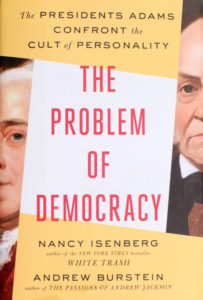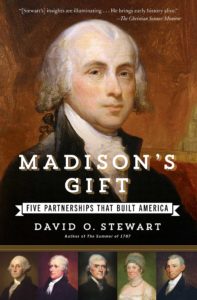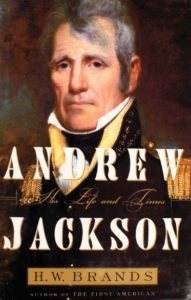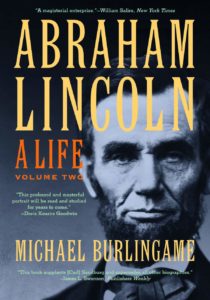
Thank you for joining us for our 2020 Great Presidential Lives mini-series! If you would like to view additional Great Lives lectures featuring presidential topics, take a look at the selection below. To view more, visit our Archives page.
John and John Quincy Adams
Speakers: Nancy Isenberg and Andrew Burstein
The two presidents Adams have never been examined together, either as mutually supportive father-and-son historical actors, or as experienced men of the world with interconnected philosophies. History conveniently paints them as out-of-touch, each turned out of office by popularly cast southerners, Jefferson and Jackson; their rejection at the polls is explained in terms of their supposed resistance to a rising democratic spirit. The Problem of Democracy, our first major collaboration since Madison and Jefferson (2010), elaborates on the Adamses’ constitutional thought in favor of strong institutional checks in government (as a counter to the myth of an all-knowing popular will); their critique of democracy’s tendency to “dress up” select political men as popular celebrities: in their time, Benjamin Franklin, George Washington, Thomas Jefferson, and Andrew Jackson. Their concern about a moneyed oligarchy and their unwillingness to surrender personal political independence to the conforming character of the two-party system make them unique in the nation’s political life. The themes they embraced have clear implications for our times.
*****
James and Dolley Madison
Speaker: David O. Stewart
To reach his lifelong goal of building a self-governing constitutional republic, Madison blended his remarkable talents with those of five key partners. It was Madison who led the drive for the Constitutional Convention and pressed for an effective new government as his patron George Washington lent the effort legitimacy; Madison who wrote the Federalist Papers with Alexander Hamilton to secure the Constitution’s ratification; Madison who joined Thomas Jefferson to found the nation’s first political party and move the nation toward broad democratic principles; Madison, with James Monroe, who guided the new nation through its first war in 1812, and who delivered the reins of the government safely into the last of the Founders. But it was his partnership with Dolley that allowed Madison to conquer his natural reserve and reach the greatest heights. Their partnership was a love story, one that sustained Madison through his political rise, his presidency, and a fruitful retirement.
*****
Andrew Jackson
Speaker: H.W. Brands
Andrew Jackson was the most popular figure in American life between George Washington and Ulysses Grant. He was the hero of the War of 1812 and the President who made America democratic. He is not at all popular today, condemned for his treatment of American Indians and his unreconstructed attitudes toward slavery. H. W. Brands will explain Jackson’s appeal during his own time, his fall from grace, and what it says about America.
*****
Abraham Lincoln
Speaker: Michael Burlingame
Certainly one of the greatest of all American lives, Abraham Lincoln has been the subject of more historical inquiry than any figure in the nation’s history. Almost 150 years after his death, Americans are still drawn to him, as evidenced by the popularity of the recent Steven Spielberg film, Lincoln. Michael Burlingame is among the most renowned Lincoln scholars in the world today, having written in 2008 what Publisher’s Weeklycalled the book that “supersedes all other Lincoln biographies.” In his lecture Professor Burlingame will connect Lincoln’s inner life with his outer life, addressing such questions as: What were the origins of Lincoln’s hatred of slavery? What were the qualities that made him a successful wartime President? What caused his intense ambition? How did his troubled marriage affect his career? How did the low-road politician of his twenties and thirties become the high-road statesman of his forties and fifties?
*****
Ulysses S. Grant
Speaker: Joan Waugh
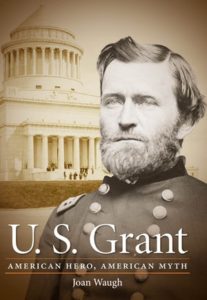 The lecture will assess the ups and downs of the reputation of General U. S. Grant, the Union’s hero during the United States Civil War and a two-term President. At the time of his death in 1885, Grant’s legacy seemed assured as one of America’s greatest generals and most essential Presidents. It was not assured at all. Grant’s immense prestige declined rapidly throughout the twentieth century largely as a result of a campaign by “Lost Cause” historians sympathetic to the South. They whittled away at his reputation, wrongly portraying him as a drunk, a military butcher-general, and a corrupt, incompetent president. All those stereotypes are distorted, reflecting a larger historical amnesia afflicting many citizens today. The lecture confronts the dilemma between history and memory and proposes why it is important to get the record right on the remarkable life of the man who, along with President Lincoln, was credited by his own generation as “Saving the Union.”
The lecture will assess the ups and downs of the reputation of General U. S. Grant, the Union’s hero during the United States Civil War and a two-term President. At the time of his death in 1885, Grant’s legacy seemed assured as one of America’s greatest generals and most essential Presidents. It was not assured at all. Grant’s immense prestige declined rapidly throughout the twentieth century largely as a result of a campaign by “Lost Cause” historians sympathetic to the South. They whittled away at his reputation, wrongly portraying him as a drunk, a military butcher-general, and a corrupt, incompetent president. All those stereotypes are distorted, reflecting a larger historical amnesia afflicting many citizens today. The lecture confronts the dilemma between history and memory and proposes why it is important to get the record right on the remarkable life of the man who, along with President Lincoln, was credited by his own generation as “Saving the Union.”
*****
Dwight Eisenhower
Speaker: Evan Thomas
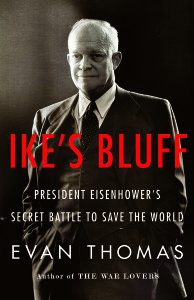 President Dwight Eisenhower is remembered as a grandfatherly figure who presided benignly over the prosperous but dull 1950s. In fact, the 1950s were a dangerous decade as the two great superpowers, the United States and the Soviet Union amassed huge nuclear arsenals and came close to using them. In his biography Ike’s Bluff, Thomas shows how Eisenhower, the hero of World War Two, avoided a far deadlier World War Three. Ike was hardly the genial, slightly dim figure he appeared to be, but rather a crafty, calculating commander in chief who used all his wiles and his profound experience with a terrible war to avoid a worse one.
President Dwight Eisenhower is remembered as a grandfatherly figure who presided benignly over the prosperous but dull 1950s. In fact, the 1950s were a dangerous decade as the two great superpowers, the United States and the Soviet Union amassed huge nuclear arsenals and came close to using them. In his biography Ike’s Bluff, Thomas shows how Eisenhower, the hero of World War Two, avoided a far deadlier World War Three. Ike was hardly the genial, slightly dim figure he appeared to be, but rather a crafty, calculating commander in chief who used all his wiles and his profound experience with a terrible war to avoid a worse one.
